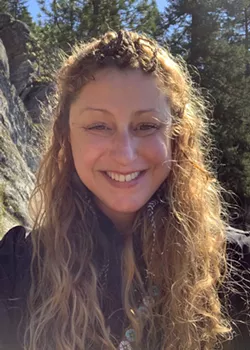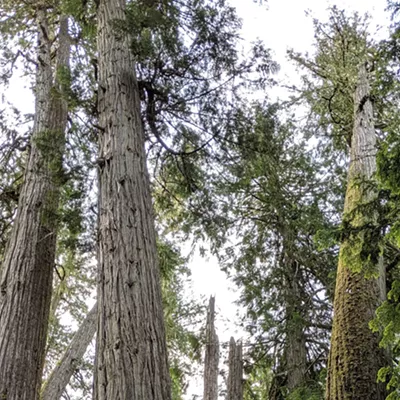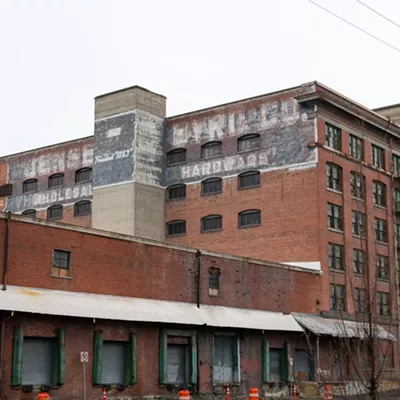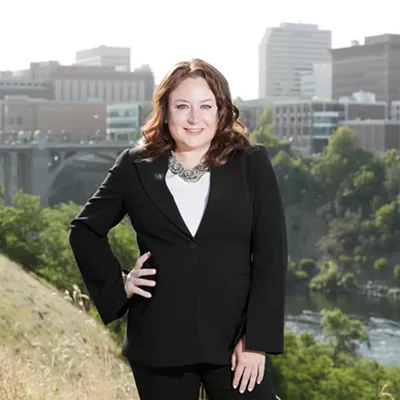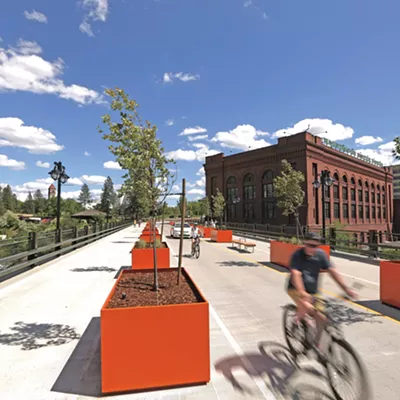
In 1987, a group of engaged citizens formed the Selkirk Conservation Alliance in response to the aggressive logging practices in the Priest Lake watershed. Left unchecked, those practices could harm the area's wildlife as well as its air and water quality, which is to say the very attributes that make Priest Lake such a desirable place to live and recreate.
Amy Anderson joined the SCA in April 2021 as the organization's executive director — its only full-time employee. She spoke with the Inlander about the organization's key activities, its active volunteer base and its three pillar programs: environmental advocacy, environmental education and scientific research.
INLANDER: What's the mission and scope of the Selkirk Conservation Alliance?
ANDERSON: Over the last 37 years, SCA has worked on a spectrum of environmental issues, from opposing destructive forestry practices to things like wildlife conservation of threatened and endangered species, particularly the grizzly and the caribou. But most recently, through an intensive strategic planning process in the winter of 2020, our board decided to focus our limited staff time and funding on surface and groundwater quality conservation in the basin within our advocacy area. That area includes the lower Selkirk range, which is kind of delineated by the Kootenay River on the east and then the Pend Oreille River on the south and to the west.
And what form does that advocacy for surface and groundwater take?
A lot of times it's not super sexy and not front-page news. It's just a lot of watchdogging and commenting on county, state and federal plans and policies, permits, or development that would negatively impact special sites or threatened and endangered species or their habitat. We fought the Newport smelter [to prevent] air-quality issues in the basin.
However, I definitely want to be clear that the SCA is not anti-development. We're just pro-common sense development that preserves important sites like wetlands and salmon spawning grounds. And when we need to, we alert our greater community and call for public hearings. So it's bringing a lot of our voices to the table just for better stewardship of public and private lands.
What about your educational initiatives? What do they look like?
We give a lot of talks to our local community, you know, working with organizations like the Lions Club and the Master Naturalists. And we also have what we call our living classroom field trip. That's where we get kids outside in their watersheds, learning and feeling and smelling and hands-on with everything. So, for example, depending on what site we're at, we'll have stations based on wetlands or river systems or native fisheries or forestry. We even had a nature poetry station, which was pretty cool.
And I'm guessing both your advocacy and education efforts draw on the third pillar, scientific research?
We have a robust community-based, all-volunteer citizen science program that started in 2008. Since then, we've been collecting water quality monitoring data on 17 sites on Priest Lake and one site on Upper Priest Lake. And in 2018, I think it was, we started a primary tributary stream monitoring program. We are now monitoring 17 of the primary stream systems that feed into the basin. We have four deep-water sites, but most of our sites are in the shallower bays.
We're sampling for chlorophyll A and temperature. We do full dissolved oxygen and temperature profiles to the bottom of the lake. We collect samples for nutrients [such as] nitrogen and phosphorus. We collect data on pH, turbidity, conductivity and also secchi depth [which is a measure of water transparency]. So it's quite a suite of parameters that we're collecting information on. And because we have traditionally had excellent water quality in Priest Basin, a lot of the work is proactive. But we are seeing some changes.
What sort of changes?
Over time, we're seeing a slight increase in surface temperatures. And we are seeing more algae growth in the bays. What's really special about our North Idaho lakes — in particular Lake Pend Oreille, Upper Priest Lake and Priest Lake — is that they're oligotrophic lakes, which translates to, in Greek, "few feeders," which means we don't have a lot of algae. It's bright blue and clear because there's nothing growing in it. But when you see aquatic plant populations starting to increase, you know that it goes directly hand in hand with nutrients entering into the system. Those nutrients are entering when we have development, when we have shoreline erosion, when we have sewer systems not doing what they're supposed to do.
It was passionate volunteer locals who started SCA. Are folks like that still supporting its mission now?
We're the definition of a grassroots nonprofit. I would say we easily have a hundred solid volunteers that keep driving us. And then we have probably 100 more coming in and out as needed for different programs and projects. Even our board is a working board. They really carry the heavy weight of our water-quality monitoring work.
We also engage a lot of agencies. We partner with folks like Idaho Fish and Game and Panhandle Master Naturalists and the Army Corps of Engineers when we do our outdoor education. And so, I feel kind of like my job is easy because we just have so many people that are passionate and love this area. I truly feel like it's people looking after their own backyards that have made the greatest strides in the environmental movement hands down, because they care the most. ♦

